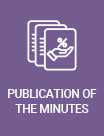Minutes for Banco de la República’s Board of Directors Meeting on October 28, 2022
Banco de la República's Board of Directors (BDBR) unanimously decided to raise the monetary policy interest rate by 100 basis points (bp) to 11%.
In the discussion on monetary policy, the following elements were considered:
- During October, adverse financial conditions worsened, brought on by global and idiosyncratic factors. These conditions caused a higher monthly depreciation of the COP/USD exchange rate than that of other emerging economies and an increase of TES interest rates and risk premia.
- Total annual inflation rose from 10.8% to 11.4% from August to September, whereas core inflation—excluding food and regulated items—went from 6.9% to 7.5%. The increase in inflation is explained by additional pressure in food production costs, higher electricity prices, the exchange rate pass-through to tradable goods, strong demand, and indexation processes for rising inflation rates.
- Expected inflation measures continued to increase during the last month, steering away from the target. Banco de la República’s monthly survey of economic analysts indicates that the expected annual inflation rate went from 6,3% to 6,7%. Other surveys (carried out by third parties) indicate additional increases in the expected inflation for 2023.
- According to the economic tracking indicator (ISE), the annual growth for economic activity during August was 8.7%, driven by consumption growth as well as by investment in machinery and equipment. The technical staff’s annual GDP growth forecast is 7.9% for 2022 and 0.5% for 2023. Despite the expected deceleration, the GDP forecast sets values 12% higher than those observed in 2019, prior to the pandemic. On the other hand, expected total consumption is 15% higher than that observed for 2019.
- According to the most recent data, employment levels are significantly higher than those that preceded the pandemic and have been on the rise for all sectors, especially the formal sector. Labor participation has been stable and the unemployment rate has dropped beneath 11%. Other indicators of the labor market, such as the ratio of job openings to unemployment, also suggest favorable labor behavior.
- Observed rises in inflation, economic activity, the exchange rate, risk premia, and interest rates have surpassed the technical staff’s projections. These new elements pose a different scenario from the one considered in the last Board of Directors meeting.
All members of the Board of Directors consider that, during the last month, the conditions for external financing of the economy have been deteriorating. Although this deterioration was partially reverted in days prior to the Board’s meeting, the most recent data still show depreciation of the Colombian peso and an increase in the risk premium for the public debt, when compared to one month prior. All of the aforementioned justify a 100pb increase of the interest rate. This unanimous decision is a strong manifestation of the Board’s commitment to monetary and exchange rate stability.
During their personal statements, several directors highlighted the high levels observed for inflation, economic activity, and international interest rates, which are higher than expected during the last Board meeting. These directors expressed their concern for the persistent increase of the economy’s demand above levels sustainable in the long-term, as well as for the increase in inflation expectations for the next years. With the interest rate increase, they seek to contribute to the adjustment of economic activity towards levels sustainable in the long-term and to the convergence of inflation expectations at the inflation target.
Some directors also stated their concern regarding fiscal imbalance and the public debt market’s vulnerability. They expressed that the decision of increasing the interest rate contributes to sustaining foreign investor confidence in the Colombian public debt market and financing of the current account deficit. One of the directors highlighted the need to balance nominal GDP growth and the growth of monetary aggregates through the increase of interest rates that would strengthen demand in the Colombian peso market.
All of the directors underlined the importance of supply factors in the recent evolution of inflation. One of them considered that these factors are, by far, the determining factor and expects them to improve in the upcoming months, contributing to reducing inflation. Be that as it may, for this director, the economy’s financing conditions, along with growing international interest rates, justify the agreed upon interest rate increase. The monetary policy rate is in a contractionary stance, with which a path of convergence towards the target inflation rate of 3% is expected to be guaranteed. This stance reaffirms the commitment of the Board of Directors to the inflation target as well as to the stabilization of economic activity in the most sustainable way possible.














.png)

































